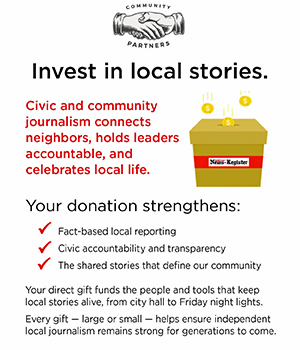Foreclosure innovation paying real dividends
We commend Yamhill County for offering the city 12 lots from a failed Dayton subdivision for the amount of back taxes owed on them.
The tax obligation on the lots is a grand total of just under $31,000. At a time when access to sewer and water service has individual lots often commanding five times that, acquiring a dozen for such a modest sum represents an incredible bargain.
But the county isn’t trying to provide the city with a windfall. It is requiring affordable housing be developed on the lots.
The county is using the bargain-basement price to make that possible. If you reduce the cost of the land to virtual pocket change, county officials reason, you can bring the resulting housing in well below the going rate.
Credit Commissioner Mary Starrett for proposing the idea in the first place and displaying the grit and gumption to see it through. It would have been much easier for her to simply let the process run its course, as a litany of past commissioners have been content to do.
Starrett’s initial thinking was that foreclosure sale proceeds exceeding the tax obligation should rightfully be returned to the original owner. When she discovered state law prevents that, she began instead assessing potential beneficial uses of foreclosed properties or proceeds from their sale.
While the new initiative is still in the early stages, it has also led to sale of a foreclosed Newberg home to Habitat for Humanity and offer of a foreclosed McMinnville home to the adjacent Gospel Rescue Mission at equally affordable rates.
In addition, Starrett is hoping the county will be able to transform another foreclosed home into a youth center. The county evaluated the McMinnville property for that purpose, but decided it wasn’t suitable.
The city of McMinnville has been devoting countless hours to the affordable housing issue in recent years. That has produced a broad array of initiatives, now in various stages.
But so far, the city output has been limited largely to studies, task forces, reports, hearings, surveys, discussions and debates. With a minimum of bureaucratic trappings, all limited to recent weeks, the county has already produced far more tangible results.
We don’t mean to denigrate the city’s sincere, well-meaning effort, which could end up producing a gusher of concrete results in the end, but talk is invariably cheaper than action. It would sure be nice to see some of the city’s affordable housing initiatives begin to gain traction.
We were not encouraged when the city planning commission initially rejected a recent subdivision over land-saving setbacks and lot-size reductions designed to lower selling prices. That’s patently counter-productive.
The local homeless won’t be buying any of the new homes, but they could well be moving into spaces freed up through the resulting domino effect. As one group of residents seizes an opportunity to move up, so does each group below on the economic hierarchy.












Comments